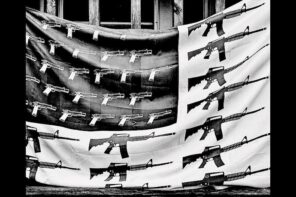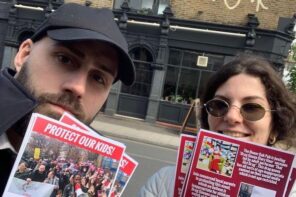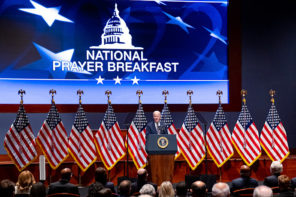Before the Tea Party Express brought tens of thousands to protest in the nation’s capital, and before town hall meetings about health care devolved into shout downs, there was the story of the boys of C Street.
What at first seemed like a series of public sex scandals turned out to have a connective thread. The main protagonists (Governor Mark Sanford of South Carolina, Senator John Ensign of Nevada, and former Arkansas Congressman Chip Pickering) were all one-time residents of C Street and members of the Family, otherwise known as the Fellowship. As the summer unfurled, the “three amigos” gave mainstream media outlets plenty to talk about, and this highly secretive and powerful right-wing group got a lot of exposure. And then, as is the wont of the media, the story of C Street disappeared from the headlines.
In this exclusive Religion Dispatches interview, Jeff Sharlet, author of 2008’s The Family: The Secret Fundamentalism at the Heart of American Power, talks about The Family and its summer of scandal, the organization’s tarnished present and future possibilities, and why the mainstream media had such a difficult time dealing with the group’s unusual political/religious beliefs.
First off, tell us three critical things we should know about The Family?
Jeff Sharlet: The Family is the oldest and arguably most influential religious conservative organization in Washington, a “brotherhood” comprised mostly of politicians such as Senator Jim Inhofe, Senator Tom Coburn, Senator Sam Brownback, Senator Jim DeMint, and, now infamously, Senator John Ensign, Governor Mark Sanford, and former congressman Chip Pickering, all of whom turned to The Family to help cover up sex scandals this past summer. The reason you may not have heard about the group is that it doesn’t want you to hear about it—“the more invisible you can make your organization,” preaches leader Doug Coe, “the more influence it will have.” They’re not the only group in Washington that keeps a low profile, but it’s the nature of their influence that’s really noteworthy: some congressmen call it simply personal and thus private, but nearly 600 boxes of documents stored at the Billy Graham Center Archive reveals decades of intense political work around foreign and economic affairs.
Most people don’t know anything about Doug Coe, the Family’s longtime leader. How did he manage to escape the public spotlight for such a long period of time? What makes him such a unique figure?
A few years ago, Time magazine was making up a list of the 25 most powerful evangelicals. Since I write a lot on these subjects, they asked me who I’d suggest. I said Coe. “Who’s he?” the reporter, David Van Biema, responded. I told him to call the offices of a dozen congressmen—if at least half didn’t mention Coe, don’t include him. Well, Coe made the list, at number four, pictured with Bush, Sr., under the headline, “The Stealth Persuader.”
The secret to his stealth is simple: In a city where everybody wants to be in the news, Coe isn’t seeking publicity. Way back in 1966, when he first began assuming leadership of the organization he’d come to re-brand as the Family, he sent out a memo declaring that the time had come to “submerge” the group’s public profile. In a rare interview, he admits that the National Prayer Breakfast—owned and organized by the Family since its founding in 1953, despite its official appearance—isn’t “one tenth of one percent” of what the Family accomplishes behind the scenes.
That penchant for “invisibility,” as he calls it, makes him unusual, but don’t mistake him for some humble servant of the Lord. Above all else, Coe admires strength, of the iron fist variety. Over the years he’s acted as a de facto lobbyist for strongmen ranging from Haiti’s Papa Doc Duvalier to Indonesia’s Suharto. Disavowing the strident pulpit-pounding that makes headlines, Coe preaches a far more authoritarian message, advising congressmen to look to “evil men” such as Hitler, Stalin, and Mao for insight into the nature of Christ’s power.
Why did the much of the mainstream media—with the exception of MSNBC’S Rachel Maddow—lose interest in the C Street story after they mined the sex out of it?
I can only speculate. To be fair, it’s not quite that bad or that unusual. First, there’s the fact that having written about this for a number of magazines that might be said to be sort of mainstream (Harper’s, Rolling Stone, The New Republic, Mother Jones) and talked about it on very mainstream television programs (NBC Nightly News, CNN, etc.) and radio (Marketplace, Fresh Air, BBC, etc.), I’ve sort of established ownership of the story. That may be a good thing for my book sales, but it’s bad for journalism, because it discourages other reporters from digging in.
Fortunately, there are a lot of solid journalists working around the country who didn’t get the memo: we’ve seen local news investigations in Kansas, Oklahoma, Tennessee, Michigan, Nevada, North Carolina, and beyond. That’s because some of those regional reporters simply aren’t that invested in access in the same way that national reporters are. That’s the good news.
The bad news is that this is a very, very hard story for mainstream media to handle for the following reasons: 1. It’s weird, and contrary to conventional wisdom, and most reporters shy away from the strange; 2. It’s intellectually challenging, since to understand what’s going on one has to not only follow the money but also the ideas that make the Family different than other movements; 3. The press is religiously illiterate; 4. The Family doesn’t operate along traditional partisan lines, the only schematic of power a lot of political reporters are trained to understand.
Here’s one more possibility: most reporters are not only religiously illiterate, they’re Constitutionally confused. That is, they revere the First Amendment, but they don’t bother to think too deeply about the delicate balance between the Establishment Clause and the Free Exercise Clause. Respecting a politician’s freedom of religion doesn’t mean ignoring his religion—it means asking smart, sometimes tough questions about its role in his political life.
For a relatively brief period you made the rounds, were interviewed in a number of mainstream media venues. Then, nothing! What happened?
Actually, as an author, I was lucky. Spurred by the sex scandals, this story got a lot more attention than most books do; especially long, dense books with footnotes. I think I did about 200 interviews over the summer. The Washington Post called, but gave the story to a style reporter. Gail Collins cited my book favorably in the New York Times, but got it wrong. Maureen Dowd pinched the story and got it wrong, too. TV was what mattered.
The ones that made a difference, in terms of moving the story along and getting things rolling at the local level around the United States, are surprising: The Rachel Maddow Show, on which I appeared eight times, had a much bigger impact than NBC Nightly News; Real Time With Bill Maher moved more books and provoked more former members of the Family to get in touch with me than The Daily Show. Chris Matthews used the last seconds before going live to lean across the desk to tell me, “I don’t know if I get this. I don’t know if want to!” And he didn’t, rattling on about how he used to like to stay at the YMCA. But what the hell, it got the books into more hands and I got to hang out in the green room with one of my anti-heroes, Pat Buchanan, who off screen wears this big blocky designer glasses that look like he stole them from a drag queen or a Miami yenta, two demographics with whom he’s had his differences over the years.
Rick Sanchez of CNN’s Newsroom was much more informed than I expected; he’d clearly read some of the book, which is rare. Jon Stewart wanted to talk about Calvinism in the green room, but on screen we mainly talked about C Street and sex in the kitchen. Radio, of course, was a whole different story. The bottom line is that the further you got from establishment press, the more serious the questions became. The Las Vegas Sun didn’t want to giggle with Maureen Dowd about sexual improprieties; they wanted to follow the money, and they did, brilliantly.
What is C Street currently up to? How do they connect with people’s day-to-day concerns, like health care, the economic crisis, Afghanistan and other issues, and how do they affect policy?
The Family would say that it doesn’t do policy, and in the strictest sense, that’s correct. For years, the confidential memos the Family prepared for members of Congress involved with the group emphasized that the “prayer cells” were not to take action as prayer cells. Rather, boilerplate at the top of every memo read, action should grow out of the relationships formed there. Which is to say, the Family provides a “worldview,” fundamentalism re-tooled for the needs of power, and the relationships. What you do next is up to you. That said, the Family does not connect with “people’s day-to-day concerns”; they don’t care much about the public. But in terms of worldview and action and relationships: “biblical capitalism,” laissez-faire, guides the general view of health care (see, for instance, the work of Senator Chuck Grassley and Senator Mike Enzi, two Family men involved in scuttling health care) and the economic crisis (three of the four senators who’ve voted against all five appropriations bills actually live at C Street: DeMint, Coburn, and Ensign). Afghanistan is a trickier issue. In general, the Family has always fallen on the side of hawkishness and expansionism; but I think some of the wise men of the group see the practical folly of Afghanistan. It’s hard to miss.
Will The Family be able to rehabilitate its image? What will it take? Will members continue to feel safe there?
It’s taken a hit. That became evident to me this summer as a number of congressmen did every thing they could to distance themselves from the Family. This was especially true of conservative Democrats. Rep. Bart Stupak, who’s lived at C Street for seven years, enjoying maid service provided by Christian college girls, counseling younger Family members, and getting discounted rent, now tells the Michigan press that he had no idea where he was; despite boasting to the LA Times in 2002 that the activities of C Street were secret. Rep. Heath Shuler, who at the beginning of the summer seemed to want the word out that he lived in this fundamentalist frat house, refused to confirm or deny his residence there by the end of the summer. My favorite was Senator Mark Pryor. When I interviewed him two years ago, he boasted of his involvement with “the prayer breakfast folks.” This summer, his staff told Arkansas press that I’d never spoken to him. When I offered to share the transcript, they backpedaled, simply asking me to stop connecting Pryor with the Family, which he no longer wants anything to do with.
But the Family will survive. It’s been around for 70 years. And it has plenty of defenders. Senator Jim Inhofe wants to boast of his involvement. Senator Lindsey Graham rushed to its defense. Rep. Randy Forbes, leader of the congressional prayer caucus, is proud of his association. Rep. Frank Wolf and former Rep. Tony Hall took to the pages of Christianity Today to publish such a disingenuous defense that even USA Today scoffed. But that didn’t shake them.
It’s taken a hit from its own members, but it’s not down and out.




